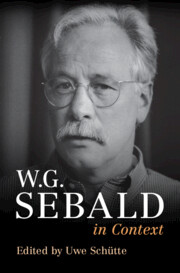Book contents
- W.G. Sebald in Context
- W.G. Sebald in Context
- Copyright page
- Dedication
- Contents
- Illustrations
- Notes on Contributors
- Preface
- Acknowledgements
- Note on Text
- Chronology
- Abbreviations
- Works by W.G. Sebald
- Part I Biographical Aspects
- Chapter 1 Allgäu
- Chapter 2 Grandfather
- Chapter 3 Manchester
- Chapter 4 East Anglia
- Chapter 5 Academia
- Chapter 6 The British Centre for Literary Translation
- Chapter 7 Between Germany and Britain
- Part II The Literary Works
- Part III Themes and Influences
- Part IV Reception and Legacy
- Further Reading
- Index
Chapter 2 - Grandfather
from Part I - Biographical Aspects
Published online by Cambridge University Press: 24 August 2023
- W.G. Sebald in Context
- W.G. Sebald in Context
- Copyright page
- Dedication
- Contents
- Illustrations
- Notes on Contributors
- Preface
- Acknowledgements
- Note on Text
- Chronology
- Abbreviations
- Works by W.G. Sebald
- Part I Biographical Aspects
- Chapter 1 Allgäu
- Chapter 2 Grandfather
- Chapter 3 Manchester
- Chapter 4 East Anglia
- Chapter 5 Academia
- Chapter 6 The British Centre for Literary Translation
- Chapter 7 Between Germany and Britain
- Part II The Literary Works
- Part III Themes and Influences
- Part IV Reception and Legacy
- Further Reading
- Index
Summary
This essay focusses on Sebald’s grandfather Josef Egelhofer. Sebald spent the first years of his life largely in the loving care of Josef, who became far more of a father figure to him than Sebald’s actual father Georg, who was mostly absent during the formative early years of his son’s life. Egelhofer made a profound impression on young Winfried and formed a close bond with his grandson that ended with his traumatic death in April 1956. First, the essay details the importance of this relationship and discusses Egelhofers role as a key figure in Sebald’s life as a teacher of the natural world. It then explores the literary manifestation of Egelhofer in Sebald’s work by way of literary figures that are sometimes directly, sometimes indirectly connected with him: the writer Robert Walser, the naturalist Alphonso Fitzpatrick, the mountain guide Johannes Naegeli, the communist leader Rudolf Egelhofer. Finally, the essay examines the ‘cult of remembrance’ Sebald commemorates in order to creatively confront his burden of grief. It is shown that his grandfather’s death is the original trauma and primal pain to which the mourning work conducted in his literary works must be traced back.
Keywords
- Type
- Chapter
- Information
- W. G. Sebald in Context , pp. 11 - 20Publisher: Cambridge University PressPrint publication year: 2023

